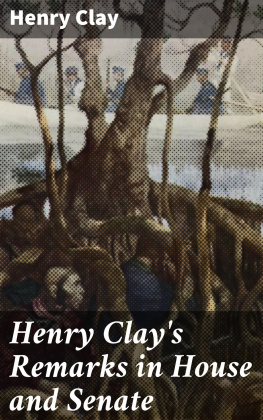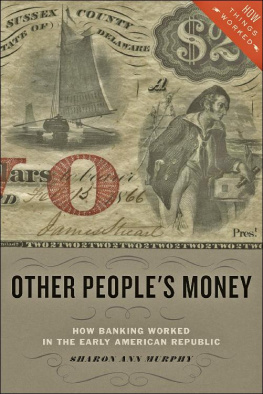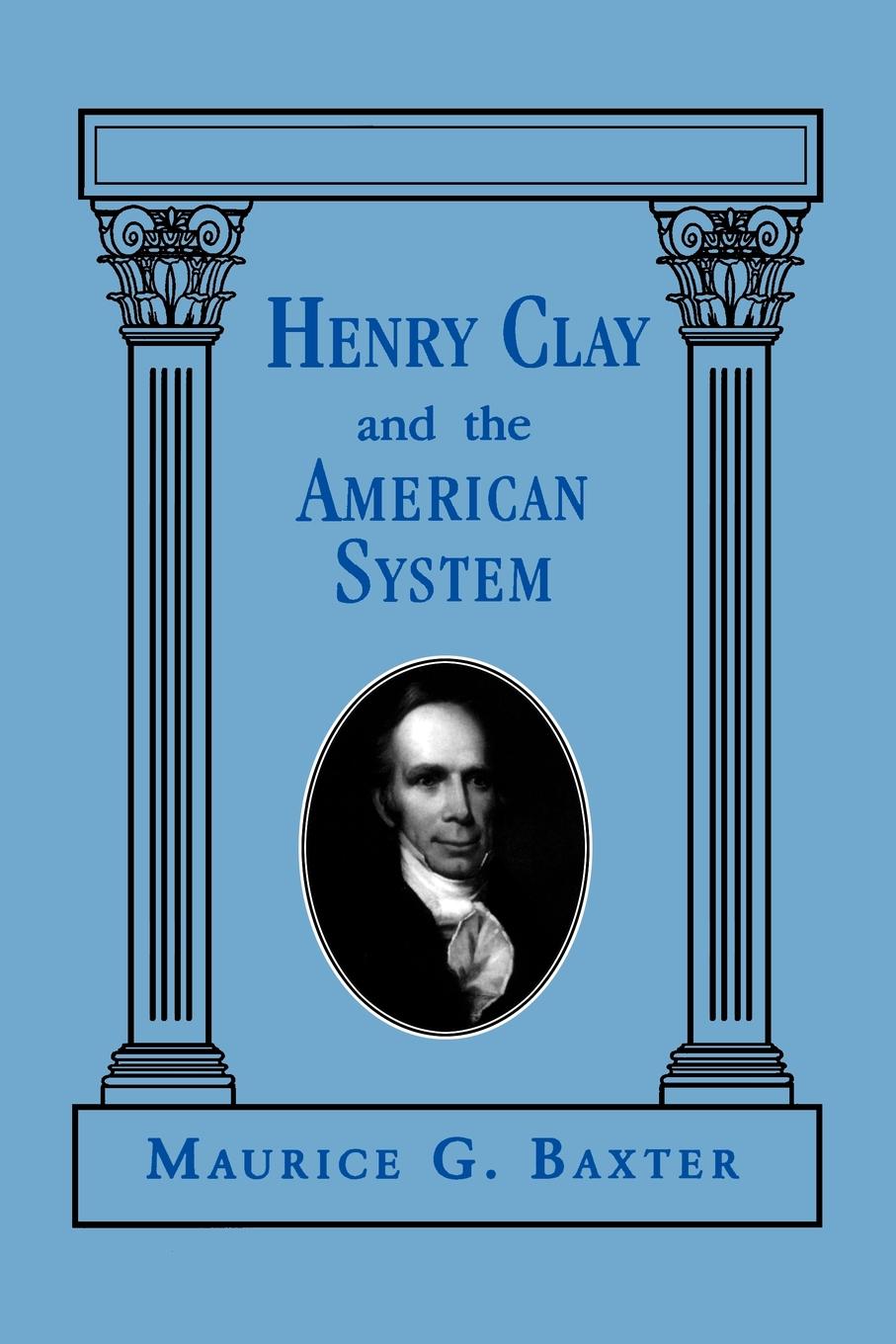Henry Clay
and the
American System
Henry Clay
and the
American System
Maurice G. Baxter
Publication of this volume was made possible in part by a grant from the National Endowment for the Humanities.
Copyright 1995 by The University Press of Kentucky
Paperback edition 2004
The University Press of Kentucky Scholarly publisher for the Commonwealth, serving Bellarmine University, Berea College, Centre College of Kentucky, Eastern Kentucky University, The Filson Historical Society, Georgetown College, Kentucky Historical Society, Kentucky State University, Morehead State University, Murray State University, Northern Kentucky University, Transylvania University, University of Kentucky, University of Louisville, and Western Kentucky University.
All rights reserved.
Editorial and Sales Offices: The University Press of Kentucky
663 South Limestone Street, Lexington, Kentucky 40508-4008
www.kentuckypress.com
The Library of Congress has cataloged the hardcover edition as follows:
Baxter, Maurice G. (Maurice Glen), 1920
Henry Clay and the American System / Maurice G. Baxter
p. cm.
Includes bibliographical references and index.
ISBN 0-8131-1919-7 (acid-free)
1. Clay, Henry, 17771852. 2. United StatesEconomic policyTo 1933. 3. United StatesEconomic conditionsTo 1865. 4. United StatesPolitics and government18151861. I. Title.
E340.C6B39 1995
973.63092dc20
[B]
94-48090
Paper ISBN 0-8131-9112-2
This book is printed on acid-free recycled paper meeting the requirements of the American National Standard for Permanence in Paper for Printed Library Materials.

Manufactured in the United States of America.

| Member of the Association of
American University Presses |
Contents
Preface
In the formative period of this republic, one of the most prominent persons in American politics was Henry Clay of Kentucky. From 1807, when the young senator came to Washington, until 1852, when he died in a hotel room there, he participated in many important events. Known as a skillful pacificator, he fashioned three great compromises of fundamental sectional differences. During his tenure in the House of Representatives (1811-1825), he advanced the role of speaker to that of an influential policymaker. At first a Jeffersonian Republican, then a highly visible leader of the Whig party, a senator, and a presidential aspirant during the thirties and forties, Clay advocated an economic nationalism called the American System. I have focused on that aspect of his career.
This is a biographical perspective upon economic history. It explores the character and impact of Clays program for growth of the United States in a political setting, as distinguished from existing studies of economic theory or econometric analysis. On numerous issues, whether concerning tariff, banking, public land, or transportation, the positions taken in congressional debate as well as during elections usually involved the meaning and applications of the Constitution, in a broad sense. So I have paid attention to this aspect but have sought to integrate it with other relevant factors. Hopefully, the result will be an improved understanding not only of the life of Clay as a colorful pathmarker but also of the dynamics of general history.
Acknowledgments
I am greatly indebted to the editors of The Papers of Henry Clay (11 vols., University Press of Kentucky, 1959-92) for their superb contribution of source materials and editorial annotations, upon which I have drawn heavily in this study, as my citations will indicate. At the Press, I received excellent advice and support. Lois Crum improved the final version with expert copyediting. Theresa Schaefer prepared a first-rate index. James Birchfield of the Special Collections in the King Library at the University of Kentucky kindly helped in making available prints of Clay portraits. And William Henning, curator of the University Art Museum, provided a valuable print. As always, Cynthia Lewis Baxter was much involved in the enterprise.

Henry Clay. Engraving of oil portrait by John Neagle, c. 1843. Courtesy of the University of Kentucky Library, Special Collections.
1
Jeffersonian
Nationalist
At the beginning of the nineteenth century the new western state of Kentucky offered splendid opportunities to an ambitious young lawyer in the fast-growing town of Lexington. Near the house of Henry Clay at Mill and Second Streets were signs of a go-ahead community: shops of weavers, tailors, blacksmiths, and saddlers, as well as establishments of distillers and hemp manufacturers. A flourishing trade with the East, the South, and foreign countries passed through the great Ohio-Mississippi River system. The basic industry of agriculture, especially in this fertile bluegrass region, was thriving too. Here, as in other frontier areas, interest in land was intense. Optimism stimulated speculation and settlement; indeed it had done so as early as Revolutionary days when Virginians had blocked out large, if hazily bounded, grants in their transmontane county.
In 1800 Clay was only twenty-three. But he had definitely begun his ascent to prosperity and a favorable reputation. Within months after emigration from his native Virginia, he had secured admission to the bar and had begun a profitable practice. And he had married the eighteen-year-old daughter of Thomas Hart, a leading merchant-capitalist involved in a variety of enterprises. The Clays lived next door to the Harts and would become a family of social standing in their own right.
This connection merely enhanced his prospects, which depended chiefly on his unusual personal qualities. He was tall, thin, and sandy-haired, with an expressive face. His personality, at times emotional and always engaging, would be a never-failing asset. Intellectually, he was quick and resourceful. In an era of golden oratory he would be in the front rank because of his ability not only to arouse but to instruct an audience on almost any subject.
Given his circumstances, it was natural for him to move into politics without delay. His background was Jeffersonian Republican of the Virginia school. As a youth he had been a student and assistant of Thomas Jeffersons mentor, Chancellor George Wythe, in Richmond. He admired James Madisons leadership in party conflicts with the ascendant Federalists over domestic and diplomatic issues. Soon after settling in Lexington, he took part in a lively debate over changing the states constitution, which, he thought, ought to be more democratic. Arrayed against the administration of John Adams, he spoke out ardently against the Sedition Act of 1798 as violating state and individual rights. Now, during Jeffersons presidency, he would be a steady supporter of Republican principles and policies.
Like Jefferson himself, Clay tempered his subscription to states rights and limited government with a firm belief in positive efforts to forward economic development. For the republican experiment to survive, the economy must support it. Though identified as agrarians, Jeffersonians such as Clay sought national strength and true independence by also encouraging commerce and manufacturing. Perhaps there was some ideological inconsistency. Nevertheless, constitutional amendment and recourse to state and private action would be available.










